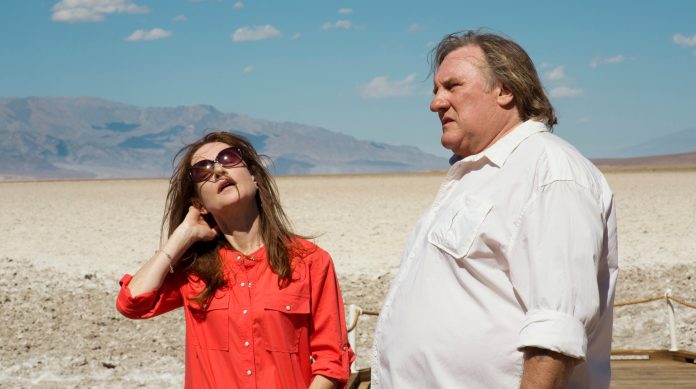THIRTY-SIX years after last appearing on screen together in Loulou, two of France’s most influential actors, Gerard Depardieu and Isabelle Huppert reunite for Valley of Love, an engaging drama helped by the retained watchable nature of the leads.
A Palme d’Or nominee from Cannes last year and under the direction of the underrated Guillaume Nicloux, it focuses on the appropriately named Isabelle and Gerard, a divorced couple, both actors, who reunite during a holiday in California.
The purpose for the visit is to honour a wish from their deceased son, handed to them via a pre-death letter, asking them to meet at Death Valley on a certain date at a certain time.
As the date approaches, the two acquaint with themselves, occasionally socialising with fellow holidaymakers and even attempting a rekindling of their relationship, in spite of Isabelle’s marriage.
Furthermore, the trip is littered with unexpected moments such as Gerard’s disclosure of a cancer diagnosis and Isabelle’s supposed nightmare that leaves Gerard having to break her hotel door down to calm her.
With the date requiring them to honour their son’s wish arriving, the two head to the Death Valley, where a series of events triggers an emotionally shattering experience both of them could never foresee.
Nicloux is following this film from two previous features of this decade which demonstrated his ability for making often highly enjoyable features, the religious drama The Nun (which Huppert starred in) and the surreal comedy The Kidnapping of Michel Hollebecq. With this, he makes a strong case for why he could be one of the top directors working in the post-Sarkozy French world.
Bringing together Huppert and Depardieu allows him to craft a scenario where having seen the younger duo dominate the screen as they did in 1980’s Loulou, we get a chance to see the pair do it again playing a much older duo but with the same intensity.
Depardieu once again shuts up those who see him for his personal life than for his acting. An actor who can improve a film just by being there, his performance feels almost a reflection of himself, for the implication shown when he expresses the need to slow down, a sort of therapy if you like. It’s a solid role which sees him on par with recent performances such as that in My Afternoons with Marguerite that remind us how he never stopped impressing.
His presence is effective in one scene when a fellow guest at the hotel asks for an autograph, despite being unable to remember what his name is. Agreeing to do so, all seems fine until he puts down his name as Bob De Niro. It results in a later argument with the same guest accusing him of rudeness that is just about soothed by Gerard’s willingness to have a drink with him.
That in turn then leads to a civil four-way conversation between Gerard, Isabelle, the fan and his wife where talk of Al Pacino is mentioned, entering a form of Birdman-esque satire. That conversation is blighted though by the deafening, foul-mouthed responses of an elderly man who makes clear his frustration as he watches sport on television.
Huppert is on fine form too, demonstrated superbly in two crucial scenes in the film, firstly during her outbreak of hysteria when a nightmare occurs. Without issuing any form of spoiler, that scene is a precursor for the climactic sequence which puts both actors and director on top of their game. Huppert and Depardieu both deliver an emotionally charged sequence following the events which take place when they go to the place their son requested them to visit, which comes as surprising and quite moving for what is depicted. It also is no surprise watching this that both received Cesar nominations earlier this year on the strength of this sequence.
There is something respectable about this film, given that it rides on the shoulders of the two leads and the film is entertaining because the two are such masters of their craft. Even a set of long takes which show both characters walking around feels interesting to watch because we wonder what they are going to get out of this journey and what is going to come next. There are moments when the two bicker or discuss things in a genteel manner and on both sets, it succeeds.
By the end, there is a sense of ambiguity, but one that feels suitable. The changing of emotions by both leads diversifies the film and while waiting for the inevitable visitation at the end, there is enough going on around us that entertains instead of acting as unwanted filler until the sequence is unleashed.
Enjoyable to watch, Valley of Love makes good use of its two lead actors and thanks to an interesting direction by its talented director, it also leaves us partial to a future reunion between its actors and director.






























